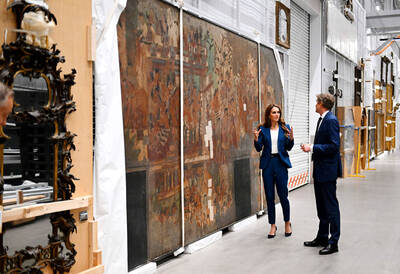After the last Ming Wu (明武) tournament in Hsinchu on March 1, a local newspaper portrayed the event as a no-holds-barred, blood-soaked street fight that shocked a crowd which included women and children. This melodramatic journalism was reminiscent of the mid-1990s when mixed martial arts, or MMA, was still gaining traction in the US and Senator John McCain called the sport “human cockfighting.”
Now, MMA has become one of the fastest-growing sports in the world, which is good news for Ming Wu, an association dedicated to training and teaching many different styles of martial arts and providing a world-class stage for fighters looking to gain experience inside the octagon. Holly Itoga, a promoter for Ming Wu, describes MMA as “the ultimate test of strength, mentally and physically. It’s exciting; it incorporates different disciplines of martial arts like judo, Brazilian jujitsu, wrestling, and even Chinese kung fu. MMA gets down to the basics of man versus man.”
Tomorrow’s event, called Standing Orders, is the fifth in a series for Ming Wu.
While audiences can expect to see hard-hitting strikes, expeditious takedowns and even some ground and pound, the men who will be scrapping are not just brawlers off the street or bouncers from some club. They’re English teachers, college students, office workers and martial arts instructors who spend countless hours training and getting their bodies in peak physical shape. Fighters must submit to a mandatory health check and weigh-in before each bout because their safety is a primary concern.
Ming Wu associate Nazeem Solarie said the fighting showcases have grown from 250 to 3,000 attendees after four events in less than one year. This proliferation of fans and fighters means that soon combatants at Ming Wu contests will not only be going against each other for bragging rights and prize money, but also title belts.
Recently, Pro-Fighting, a new MMA organization in Taiwan, almost sold out its debut at Luxy by mixing combat with DJs, dancers and hip-hop groups.
“As MMA matures here in Taiwan, there is more than enough room for two or even more fighting companies,” Itoga said. “I hope soon there will be events in different cities all over the island.”
Previously, when there were fight nights or boxing matches at clubs or gyms, expatriates would dominate because they had been practicing MMA for much longer. Itoga thinks that it is now Taiwan’s time to shine.
“I’m excited for the Taiwanese. Once they decide to do something, they can be really good in a short period of time,” she said. “MMA fits into the Taiwanese code of hard work, honor, and having heart. Taiwan is perfectly fitted for MMA to succeed.”

June 9 to June 15 A photo of two men riding trendy high-wheel Penny-Farthing bicycles past a Qing Dynasty gate aptly captures the essence of Taipei in 1897 — a newly colonized city on the cusp of great change. The Japanese began making significant modifications to the cityscape in 1899, tearing down Qing-era structures, widening boulevards and installing Western-style infrastructure and buildings. The photographer, Minosuke Imamura, only spent a year in Taiwan as a cartographer for the governor-general’s office, but he left behind a treasure trove of 130 images showing life at the onset of Japanese rule, spanning July 1897 to

One of the most important gripes that Taiwanese have about the Democratic Progressive Party (DPP) is that it has failed to deliver concretely on higher wages, housing prices and other bread-and-butter issues. The parallel complaint is that the DPP cares only about glamor issues, such as removing markers of Chinese Nationalist Party (KMT) colonialism by renaming them, or what the KMT codes as “de-Sinification.” Once again, as a critical election looms, the DPP is presenting evidence for that charge. The KMT was quick to jump on the recent proposal of the Ministry of the Interior (MOI) to rename roads that symbolize

On the evening of June 1, Control Yuan Secretary-General Lee Chun-yi (李俊俋) apologized and resigned in disgrace. His crime was instructing his driver to use a Control Yuan vehicle to transport his dog to a pet grooming salon. The Control Yuan is the government branch that investigates, audits and impeaches government officials for, among other things, misuse of government funds, so his misuse of a government vehicle was highly inappropriate. If this story were told to anyone living in the golden era of swaggering gangsters, flashy nouveau riche businessmen, and corrupt “black gold” politics of the 1980s and 1990s, they would have laughed.

Imagine being able to visit a museum and examine up close thousand-year-old pottery, revel alone in jewelry from centuries past, or peer inside a Versace bag. Now London’s V&A has launched a revolutionary new exhibition space, where visitors can choose from some 250,000 objects, order something they want to spend time looking at and have it delivered to a room for a private viewing. Most museums have thousands of precious and historic items hidden away in their stores, which the public never gets to see or enjoy. But the V&A Storehouse, which opened on May 31 in a converted warehouse, has come up